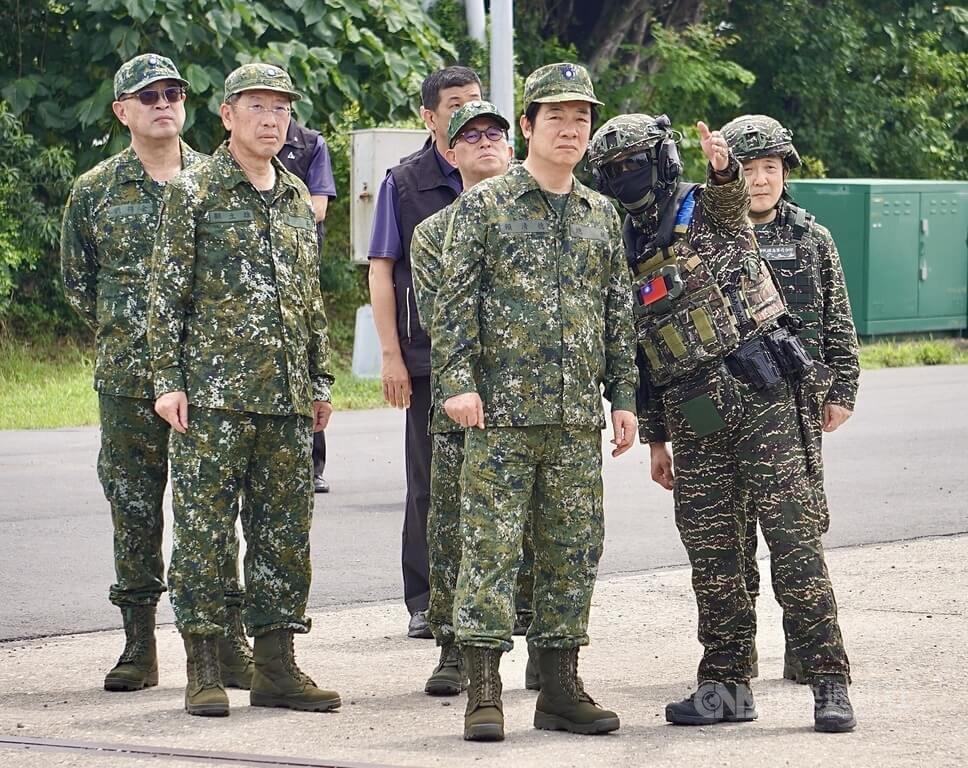The ongoing Han Kuang military drills entered their sixth day today, with units simulating repelling enemy landings in Penghu County, setting up fortifications in Tainan, laying anti-ship mines in Kaohsiung and conducting urban combat drills in Taipei.
At 5am in Penghu — part of the exercise’s first combat zone — participating units responded to a simulated rapid enemy landing on beaches, combining infantry as well as armored personnel.
First Combat Zone Commander Chen Chun-yuan (陳俊源) personally led the combined armed troops in countermeasures, utilizing a variety of weapons systems.

Photo: CNA
Wang Keng-sheng (王鏗勝), the commander in charge of the Penghu Defense Command’s mechanized battalion, said he would score the exercise “100 percent.”
Since taking leadership of the unit in May, Wang said he has followed the principle of “one day without war, one day without feeling at ease,” ensuring that participating personnel are sure of their roles.
In Tainan, the army’s 54th Engineer Group conducted a nighttime exercise in constructing defensive fortifications to block a potential enemy advance.
The unit deployed “Czech hedgehogs,” moved abandoned vehicles into the roadway and installed razor wire barricades, among other measures, to make it difficult for enemy personnel and vehicles to pass.
Some drivers who passed by the area while soldiers set up the fortifications shouted words of encouragement.
It is important to test how quickly fortifications could be erected in a low-light environment, personnel said.
The site was cleared by 5am, they added.
In Kaohsiung’s Zuoying District (左營), President William Lai (賴清德) observed a mine-laying exercise and provided personnel with extra meal money to encourage them and show appreciation for their work.
Chang Chia-ming (張家銘), from the navy’s 192nd Fleet's mine operations squadron, told the president and other officials about the three different types of mines Taiwan uses, all domestically designed and produced.
The mines target enemy surface vessels and submarines, Chang said, adding that they are a “shield” for the country.
Mines are cheap to deploy, but expensive and time-consuming to remove as an invading force, Chang said, citing historic examples such as the Korean War and the 1991 Gulf War.
In Taipei, US-imported FIM-92 Stinger shoulder-fired missiles made a rare public appearance during early-morning drills in the Taipei Metro simulating a Chinese invasion.
The exercises featured Military Police troops carrying Stingers, machine guns, 40mm grenade launchers and anti-armor rockets, and were held between Shandao Temple Station and Longshan Temple Station while the metro was closed to passengers.
The Ministry of National Defense said the exercises simulated Taiwanese troops using the metro system to quickly reach a target area and engage the enemy.
Separately, the ministry said that 17 Chinese aircraft were monitored in the airspace around Taiwan between 6am yesterday and 6am today.
Of the 17 aircraft, seven crossed the median line of the Taiwan Strait, it said.
A further eight naval vessels were also spotted in the waters around Taiwan, it added.

Taiwanese can file complaints with the Tourism Administration to report travel agencies if their activities caused termination of a person’s citizenship, Mainland Affairs Council Minister Chiu Chui-cheng (邱垂正) said yesterday, after a podcaster highlighted a case in which a person’s citizenship was canceled for receiving a single-use Chinese passport to enter Russia. The council is aware of incidents in which people who signed up through Chinese travel agencies for tours of Russia were told they could obtain Russian visas and fast-track border clearance, Chiu told reporters on the sidelines of an event in Taipei. However, the travel agencies actually applied

Japanese footwear brand Onitsuka Tiger today issued a public apology and said it has suspended an employee amid allegations that the staff member discriminated against a Vietnamese customer at its Taipei 101 store. Posting on the social media platform Threads yesterday, a user said that an employee at the store said that “those shoes are very expensive” when her friend, who is a migrant worker from Vietnam, asked for assistance. The employee then ignored her until she asked again, to which she replied: "We don't have a size 37." The post had amassed nearly 26,000 likes and 916 comments as of this

New measures aimed at making Taiwan more attractive to foreign professionals came into effect this month, the National Development Council said yesterday. Among the changes, international students at Taiwanese universities would be able to work in Taiwan without a work permit in the two years after they graduate, explainer materials provided by the council said. In addition, foreign nationals who graduated from one of the world’s top 200 universities within the past five years can also apply for a two-year open work permit. Previously, those graduates would have needed to apply for a work permit using point-based criteria or have a Taiwanese company

The Shilin District Prosecutors’ Office yesterday indicted two Taiwanese and issued a wanted notice for Pete Liu (劉作虎), founder of Shenzhen-based smartphone manufacturer OnePlus Technology Co (萬普拉斯科技), for allegedly contravening the Act Governing Relations Between the People of the Taiwan Area and the Mainland Area (臺灣地區與大陸地區人民關係條例) by poaching 70 engineers in Taiwan. Liu allegedly traveled to Taiwan at the end of 2014 and met with a Taiwanese man surnamed Lin (林) to discuss establishing a mobile software research and development (R&D) team in Taiwan, prosecutors said. Without approval from the government, Lin, following Liu’s instructions, recruited more than 70 software